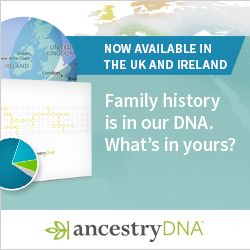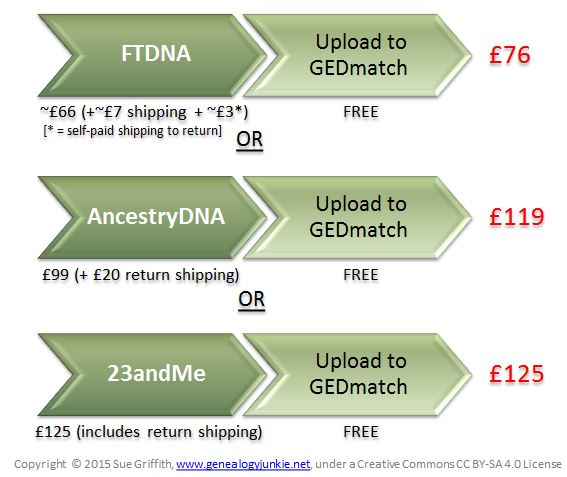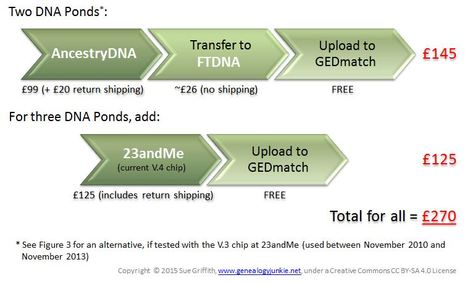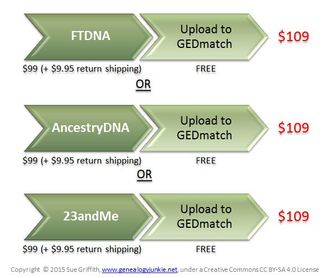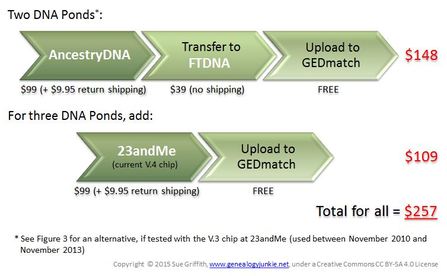The formatting of the blog posting may be odd if you are reading this in a Feed Reader or via e-mail distribution, so click on the title above (which is an active link) to view the website version.
|
The big news this week for anyone with British ancestry is the announcement that AncestryDNA is now available in the UK and Ireland – click on the image for Ancestry UK's blog posting and see Here for the press announcement, as reported by Chris Paton on The British GENES blog. With Ancestry's marketing power and brand-recognition, this is likely to provide a huge boost in the number of Brits in the DNA databases, which will be very welcome for anyone with British ancestry (whether they know it or not) and should make it a lot easier for many of us to make genealogical connections through DNA testing.
|
Debbie Kennett wrote a great blog posting, AncestryDNA test now on sale in the UK and Ireland, on the day AncestryDNA (UK) became available (28 Jan 2015), and you should definitely read that if you are thinking about a DNA test. AncestryDNA launched their test in the USA in late 2012 – the link to the US site is AncestryDNA (US). Currently, AncestryDNA is only available in the UK/Ireland and the US, but the press release indicates that it will be launched in other countries later in 2015.
Because it can be confusing to work out the most cost-effective way of having your DNA tested, this blog posting covers the relative costs across companies. I've also outlined ways of getting around the major problem of AncestryDNA not providing a chromosome browser or other means of seeing or working out what the matching DNA segments are, which is an absolutely essential aspect of working with your DNA results. See Chromosome Browser War by Roberta Estes, DNAeXplained (30 Nov 2014) for a detailed explanation why this is so important. Despite this major deficit of testing at AncestryDNA, which I and many others take every opportunity to comment on (and, yes, moan about), you may be surprised that my recommendation is to test at AncestryDNA first (!!), but then to use the FREE 3rd-party tool GEDmatch and also to transfer your results to another company (Family Tree DNA) for a very modest cost. This is a very cost-effective way in being in more than one DNA database, with a whole variety of tools to show the matching DNA segments, as well as having the advantage of Ancestry's far superior family trees and probably soon, the largest autosomal DNA database.
This article is geared to those ordering from the United Kingdom, but I've repeated the schematics with US prices near the end of the posting. I apologize now for not including the prices in Euros for Irish residents, but I'm unfamiliar with the shipping charges and other specific details for Ireland.
Because it can be confusing to work out the most cost-effective way of having your DNA tested, this blog posting covers the relative costs across companies. I've also outlined ways of getting around the major problem of AncestryDNA not providing a chromosome browser or other means of seeing or working out what the matching DNA segments are, which is an absolutely essential aspect of working with your DNA results. See Chromosome Browser War by Roberta Estes, DNAeXplained (30 Nov 2014) for a detailed explanation why this is so important. Despite this major deficit of testing at AncestryDNA, which I and many others take every opportunity to comment on (and, yes, moan about), you may be surprised that my recommendation is to test at AncestryDNA first (!!), but then to use the FREE 3rd-party tool GEDmatch and also to transfer your results to another company (Family Tree DNA) for a very modest cost. This is a very cost-effective way in being in more than one DNA database, with a whole variety of tools to show the matching DNA segments, as well as having the advantage of Ancestry's far superior family trees and probably soon, the largest autosomal DNA database.
This article is geared to those ordering from the United Kingdom, but I've repeated the schematics with US prices near the end of the posting. I apologize now for not including the prices in Euros for Irish residents, but I'm unfamiliar with the shipping charges and other specific details for Ireland.
Autosomal DNA Testing Companies
The type of DNA tested by AncestryDNA is autosomal DNA (atDNA), which is the DNA found on the autosomes (Chromosomes 1-22), but in addition, X-chromosome DNA is also included in the test (females have two X-chromosomes and males have one X-chromosome). The test can be done by both males and females and it covers all branches of your family tree. Although the majority of genealogically identifiable matches will be within the last 5 generations or so (that is, up to about the 4th cousin level), finding genealogical connections up to 10 generations or even further back is possible. There are 2 other types of DNA, Y-chromosome DNA (Y-DNA) and mitochondrial DNA (mtDNA), but they each follow only one branch of the family tree:
There are 3 companies where consumers can order autosomal DNA tests for genealogical and other purposes, and if you live in the UK and US, all are available to you:
All 3 of the companies provide a list of DNA matches (from which you can try and work out your genealogical connection), as well as estimates of "ethnicity" (so-called biogeographical analysis), and they all do a good job with the actual DNA testing, so no company is better or worse with regards to competence in doing the testing. Each has pros and cons from that point on, with a variety of things such as the website interface, availability (or lack of availability!) of the required tools to maximize what can be done with your DNA test results, ease of contacting your matches, what else is offered, and education resources, to name but a few. ISOGG (the International Society of Genetic Genealogy) has a really useful Autosomal DNA Testing Comparison Chart.
Testing costs have come down considerably over the last few years, such that autosomal DNA testing is generally affordable for the average person and genetic genealogy (that is, DNA testing for genealogical purposes) is becoming mainstream in genealogy research. It has the potential to break down "brick walls" (or confirm that a particular paper trail is correct, when several possibilities exist) and it also offers the possibility and opportunity for those who are adopted or conceived by sperm or egg donation to identify their biological family – there are multiple success stories each week of this happening.
Although the majority of people test at only one company, many of us take things further and test at 2 or even all 3 of the companies, in order to be in all possible databases. And if you get the DNA testing bug (it's a very contagious bug to "catch"!), you may find yourself encouraging your relatives to be tested too, as they will have DNA matches that you don't have yourself. Autosomal DNA gets jumbled up in a process called recombination, meaning that unless you are an identical twin, you have inherited a unique combination of DNA segments, so even close relatives will have DNA matches that you don't have yourself, and likewise you will have some they don't have, even though you are connected genealogically. However, you can still get a lot out of just testing yourself, so take the plunge and order a DNA test.
My parents and I have been tested at all of the "Big 3" companies and I've "sponsored" the testing of many other relatives. All my known ancestors (some going back more than 10 generations) were British, but because I live in the US, I was able to order the tests from there (and hand-carry the kits over to the UK), even when AncestryDNA wasn't available in the UK. I've been able to work out several genealogical connections with people on our match lists at all 3 of the companies (FTDNA, 23andMe, and AncestryDNA), so while it is more difficult at the moment for Brits to make these connections than it is for Americans (due to far fewer people from the UK having been tested and in the databases for matching), it is certainly possible – and with AncestryDNA in particular now being available in the UK, the databases of British testers will grow exponentially, so I have high hopes of being able to make many more connections in the future.
- Y-DNA can only be tested in males, is inherited from the fathers, and follows the father's father's father's, etc. line
- mtDNA can be tested in both males and females, is inherited from the mother (but is only passed on by females), and follows the mother's mother's mother's, etc. line.
There are 3 companies where consumers can order autosomal DNA tests for genealogical and other purposes, and if you live in the UK and US, all are available to you:
- AncestryDNA – available only in the UK/Ireland and United States (use the link Here for the US)
Main advantages: the best and easiest to use family trees; within a short time, is likely to have the largest autosomal DNA database, and hopefully soon with a good percentage of those from the UK
Main disadvantages: no chromosome browser or any tools providing matching segment information; high percentage of matches are unresponsive when contact is made and have little understanding about DNA testing - Family Tree DNA (FTDNA) – available worldwide (order the "Family Finder" test for autosomal DNA)
Main advantages: access to all matching DNA segment data for everyone on match list, without needing to make contact; useful segment comparison and other tools; the best company for Y-DNA and mtDNA testing (not relevant to the discussion here)
Main disadvantages: smallest autosomal DNA database, but has a much higher percentage of customers from outside the US (including those from the UK); "ethnicity" estimates are not considered by some as being as accurate as at the other 2 companies (with the exception of those of Ashkenzazi Jewish descent) - 23andMe – available in 56 countries, including the UK
Main advantages: useful segment comparison and other tools; provides health information (currently only to UK and Canadian customers), which for some people is the only reason they tested there
Main disadvantages: awkward and time-consuming to make contact with matches in order to be able to see matching segments (although unlike AncestryDNA, once contact is made, the matching segment data is revealed); caps the match list to ~1000, so legitimate matches may never make it on to your list, or may drop off the bottom (but if you invite everyone on your list to "share genomes", no-one drops off the bottom of the list and your match list can exceed the normal 1000 cap); with the current Version 4 chip used, tests fewer SNPs (single nucleotide polymorphisms) than the other 2 companies
All 3 of the companies provide a list of DNA matches (from which you can try and work out your genealogical connection), as well as estimates of "ethnicity" (so-called biogeographical analysis), and they all do a good job with the actual DNA testing, so no company is better or worse with regards to competence in doing the testing. Each has pros and cons from that point on, with a variety of things such as the website interface, availability (or lack of availability!) of the required tools to maximize what can be done with your DNA test results, ease of contacting your matches, what else is offered, and education resources, to name but a few. ISOGG (the International Society of Genetic Genealogy) has a really useful Autosomal DNA Testing Comparison Chart.
Testing costs have come down considerably over the last few years, such that autosomal DNA testing is generally affordable for the average person and genetic genealogy (that is, DNA testing for genealogical purposes) is becoming mainstream in genealogy research. It has the potential to break down "brick walls" (or confirm that a particular paper trail is correct, when several possibilities exist) and it also offers the possibility and opportunity for those who are adopted or conceived by sperm or egg donation to identify their biological family – there are multiple success stories each week of this happening.
Although the majority of people test at only one company, many of us take things further and test at 2 or even all 3 of the companies, in order to be in all possible databases. And if you get the DNA testing bug (it's a very contagious bug to "catch"!), you may find yourself encouraging your relatives to be tested too, as they will have DNA matches that you don't have yourself. Autosomal DNA gets jumbled up in a process called recombination, meaning that unless you are an identical twin, you have inherited a unique combination of DNA segments, so even close relatives will have DNA matches that you don't have yourself, and likewise you will have some they don't have, even though you are connected genealogically. However, you can still get a lot out of just testing yourself, so take the plunge and order a DNA test.
My parents and I have been tested at all of the "Big 3" companies and I've "sponsored" the testing of many other relatives. All my known ancestors (some going back more than 10 generations) were British, but because I live in the US, I was able to order the tests from there (and hand-carry the kits over to the UK), even when AncestryDNA wasn't available in the UK. I've been able to work out several genealogical connections with people on our match lists at all 3 of the companies (FTDNA, 23andMe, and AncestryDNA), so while it is more difficult at the moment for Brits to make these connections than it is for Americans (due to far fewer people from the UK having been tested and in the databases for matching), it is certainly possible – and with AncestryDNA in particular now being available in the UK, the databases of British testers will grow exponentially, so I have high hopes of being able to make many more connections in the future.
GEDmatch and "Transfers" of DNA Data to FTDNA
GEDmatch:
GEDmatch is a wonderful, FREE website (although they accept donations to help with server costs and upgrades), with an excellent reputation in the genetic genealogy community, where you can upload your autosomal DNA data (once you've downloaded it from FTDNA, 23andMe, or AncestryDNA) and obtain other matches. It has some sophisticated matching and comparing tools not available elsewhere, and you may be able to find connections not identified elsewhere, as you have the option to set your own matching thresholds. It also allows those who have been tested at one testing company to be matched to those who have been tested at another company.
Links for downloading your raw data (if you use a Mac (Apple) computer, Read This or This before downloading your data):
Links for uploading your data and using GEDmatch:
Transfers to Family Tree DNA:
FTDNA is the only testing company that accepts transfers of raw autosomal DNA data from other testing companies (only the results are transferred, not your actual DNA sample). Late last year, the cost for doing this was permanently reduced to $39, i.e., ~£26 (from $69) – and until the 28 Feb 2015, there is $15 off using the coupon code "15FOR15" (without the quotes), taking the cost down to $24 (~£16). Because no sample is required, there are no shipping charges.
To make a transfer, click on FTDNA Autosomal Transfer. You can even test it out (with some limited functionality) without paying anything, including seeing your top 20 matches (but first names and e-mail addresses are hidden), seeing the matching segments using the chromosome browser, and using the Matrix tool. If you refer 4 other people who upload their data (even if they don't subsequently do anything else), you can unlock everything for free. But because the cost is so low, referring 4 people seems like too much hassle to me, so I would just pay up to unlock your results. A few notes about transfers:
GEDmatch is a wonderful, FREE website (although they accept donations to help with server costs and upgrades), with an excellent reputation in the genetic genealogy community, where you can upload your autosomal DNA data (once you've downloaded it from FTDNA, 23andMe, or AncestryDNA) and obtain other matches. It has some sophisticated matching and comparing tools not available elsewhere, and you may be able to find connections not identified elsewhere, as you have the option to set your own matching thresholds. It also allows those who have been tested at one testing company to be matched to those who have been tested at another company.
Links for downloading your raw data (if you use a Mac (Apple) computer, Read This or This before downloading your data):
- 23andMe: See Download Raw Data (23andMe is the first company covered)
- FTDNA: See Download Raw Data (FTDNA is the second company covered) and Must-Have Tools for FTDNA Users: GEDmatch (Iowa DNA Project, 21 Jan 2015)
- AncestryDNA: See How do I download my AncestryDNA raw DNA data? or Download Raw Data (AncestryDNA is the last company covered), also the YouTube Video: How to Upload Your AncestryDNA Raw Data to GEDmatch (5:50)
Links for uploading your data and using GEDmatch:
- Using GEDmatch (from DNAAdoption.com, as is the "Download Raw Data" link for all 3 companies) has details on how to upload your DNA data and how to use some of the tools available – due to upgrades at GEDmatch, some of the screenshots aren't quite how they look now, but are still easily understandable
-
GEDmatch: A free website to compare and analyze your DNA results – don't miss the link to the Word and PDF documents at GEDmatch Utilities (written by Barton Lewis and Kitty Cooper, 18 Feb 2014)
Transfers to Family Tree DNA:
FTDNA is the only testing company that accepts transfers of raw autosomal DNA data from other testing companies (only the results are transferred, not your actual DNA sample). Late last year, the cost for doing this was permanently reduced to $39, i.e., ~£26 (from $69) – and until the 28 Feb 2015, there is $15 off using the coupon code "15FOR15" (without the quotes), taking the cost down to $24 (~£16). Because no sample is required, there are no shipping charges.
To make a transfer, click on FTDNA Autosomal Transfer. You can even test it out (with some limited functionality) without paying anything, including seeing your top 20 matches (but first names and e-mail addresses are hidden), seeing the matching segments using the chromosome browser, and using the Matrix tool. If you refer 4 other people who upload their data (even if they don't subsequently do anything else), you can unlock everything for free. But because the cost is so low, referring 4 people seems like too much hassle to me, so I would just pay up to unlock your results. A few notes about transfers:
- FTDNA will accept transfers from AncestryDNA and 23andMe, but with the latter, only the Version 3 (V3) chip is compatible (used between November 2010 and November 2013) – the current chip is Version 4 and results from this can't be transferred as it has fewer SNPs than V3 (and fewer than FTDNA's chip), making it incompatible. If you aren't sure which 23andMe chip version you were tested on, log in to your 23andMe account, click on www.23andme.com/you/compare/, then go to the One-to-One tab and put your own name on both sides. If it shows >900K SNPs, then you were tested with the V3 chip; conversely, if it shows ~550K or ~570K SNPs, then you were tested using the V2 and V4 chips, respectively.
- The instructions for the upload of raw data don't give an indication that you have to unzip your raw DNA file, but you do have to do this.
- If you want to pay the $39 to unlock your results and have functionality, you have to click on the blue "Unlock for FREE" button first (which is counter-intuitive to me), and the window that then opens gives the option to pay $39 to unlock.
Costs and Recommendations
|
Figure 1 shows the costs of autosomal DNA testing for UK residents if you opt to test at a single company. Note that irrespective of where you test, I highly recommend that you upload your data to GEDmatch (see above), which is free, in order to take advantage of the additional tools available there, the additional comparisons that can be made using different matching thresholds, and the fact that you can obtain a list of people who match you and yet have tested at a different company.
|
The least expensive option for UK residents is FTDNA, where the total cost is about £76 (I used an exchange rate of £1 = $1.50). The test itself costs $99 (~£66) and the shipping charge is $9.95 (~£7); you then have to pay for mailing back to the lab in the US, which is ~£3 via normal British Mail, or ~£9 if you opt for tracking – see International Tracking and Signature Services (formerly Airsure). AncestryDNA (UK) is ~56% more expensive than FTDNA's test, at a total cost of £119 (£99 for the test and £20 for return shipping, although if more than one test is ordered, shipping for subsequent tests is £10). 23andMe is the most expensive at a total cost of £125 (which includes return shipping; this is ~64% more expensive than FTDNA's test); for any additional 23andMe kits bought at the same time and shipped to the same address, there is a 10% discount. As of December 2014, in addition to ancestry, health-related information is provided to those resident in the UK (see List of UK Health Reports for the conditions and traits shown). Health-related information is also available to Canadian residents and up until 22 Nov 2013, was also provided to US residents, until the US Food and Drug Administration (FDA) put a stop to that until 23andMe has fulfilled the required regulatory requirements (it is still available to those who tested before 22 Nov 2013).
In the US, the total cost of autosomal DNA testing at all of the "Big 3" is identical ($109, including shipping). With the exception of FTDNA, the costs are less expensive in the US than in the UK (see corresponding costs near the end of this posting).
Figure 2 shows a schematic for how to "fish in 2 or 3 autosomal DNA ponds". The most cost-effective way to be in 2 DNA databases is to test at AncestryDNA (for £119) and then to transfer your DNA data to FTDNA (for £26 – see above for information on the FTDNA Autosomal Transfer), and in addition to upload your AncestryDNA data to GEDmatch. You then have the advantage of Ancestry's far superior trees and their match list, and yet also have matching segment information at both FTDNA and GEDmatch. In order to be able to see the shared DNA with your AncestryDNA matches, however, you will need to encourage them to upload their data to GEDmatch (and let you know their GEDmatch kit number) and/or to transfer their DNA to FTDNA, so this is a less than ideal solution to AncestryDNA not providing a chromosome browser or other means of obtaining the matching segment information.
Note: If you have already tested at FTDNA (the Family Finder atDNA test), there is no point in transferring AncestryDNA results there, as the 2 companies use the same Illumina chip.
In the US, the total cost of autosomal DNA testing at all of the "Big 3" is identical ($109, including shipping). With the exception of FTDNA, the costs are less expensive in the US than in the UK (see corresponding costs near the end of this posting).
Figure 2 shows a schematic for how to "fish in 2 or 3 autosomal DNA ponds". The most cost-effective way to be in 2 DNA databases is to test at AncestryDNA (for £119) and then to transfer your DNA data to FTDNA (for £26 – see above for information on the FTDNA Autosomal Transfer), and in addition to upload your AncestryDNA data to GEDmatch. You then have the advantage of Ancestry's far superior trees and their match list, and yet also have matching segment information at both FTDNA and GEDmatch. In order to be able to see the shared DNA with your AncestryDNA matches, however, you will need to encourage them to upload their data to GEDmatch (and let you know their GEDmatch kit number) and/or to transfer their DNA to FTDNA, so this is a less than ideal solution to AncestryDNA not providing a chromosome browser or other means of obtaining the matching segment information.
Note: If you have already tested at FTDNA (the Family Finder atDNA test), there is no point in transferring AncestryDNA results there, as the 2 companies use the same Illumina chip.
Then to be in all 3 DNA databases, you will have to test separately at 23andMe; as shown in Figure 2, with the current Version 4 chip used at 23andMe, it isn't possible to transfer the raw DNA data to FTDNA. Overall, the least expensive way to be in all 3 databases is £270 for UK residents.
If you were tested with the Version 3 chip at 23andMe, which was sold between November 2012 and November 2013, you can transfer your raw DNA results to FTDNA, just as you can with the AncestryDNA results (Figure 3). It is only £26 to transfer your data, and for that low cost, it is well-worth being in the FTDNA database too. See above for how to check which chip version you were tested on.
If you were tested with the Version 3 chip at 23andMe, which was sold between November 2012 and November 2013, you can transfer your raw DNA results to FTDNA, just as you can with the AncestryDNA results (Figure 3). It is only £26 to transfer your data, and for that low cost, it is well-worth being in the FTDNA database too. See above for how to check which chip version you were tested on.
Schematics for US Residents
The schematics above are duplicated here for US residents, with the costs in US $.
Closing Comments
I can't wait for the influx of results to start coming in from Brits testing at AncestryDNA. Take a look at Presentations on DNA Testing, which gives links for presentations relating to using AncestryDNA, FTDNA, and 23andMe, and encourage your relatives and "Ancestry cousins" you have come across through normal genealogy research to be tested too. The more people in the DNA databases, the better for all of us.
UPDATE (6 Feb 2015):
Two new blog postings with additional information:
Two new blog postings with additional information:
- 2015: Most Bang for DNA Test Bucks (Judy Russell, The Legal Genealogist, 2 Feb 2015)
- Autosomal DNA 2015 – Which Test is the Best? (Roberta Estes, DNA eXplained, 5 Feb 2015)
